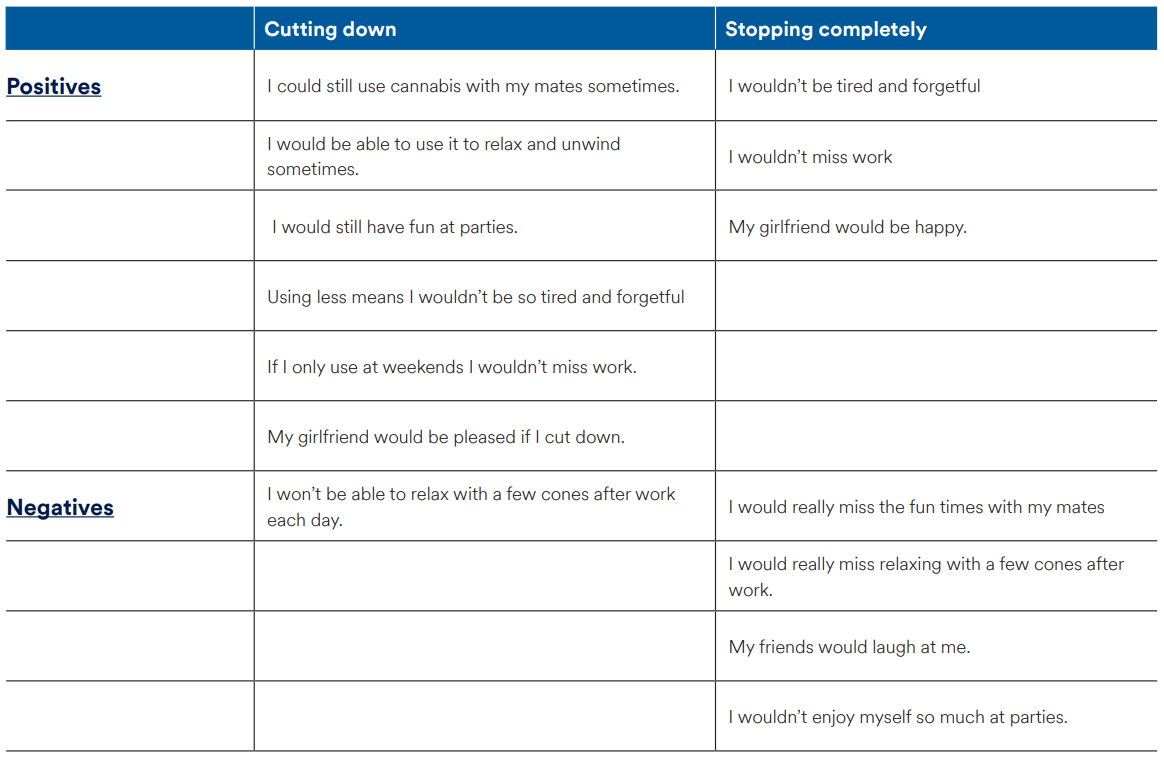Now that you’ve decided to make a change to your substance use, your next decision is whether you’ll use less, or stop using altogether.
1. Think about these questions:
• Do you have any health problems that might be made worse by your substance use? Or worries about the future if you keep using? You can ask your doctor or other health worker if you are not sure.
• Do you experience withdrawal symptoms when you stop using? If you do, stopping use entirely is probably the best goal for you. Your doctor can help you manage the withdrawal symptoms. Please also see Setting Targets How to Stop.
• Do you have any legal financial, or work problems because of your substance use?
• Do you have any family or relationship problems because of your substance use?
• Have you solved substance use problems before by stopping completely? Then this might be your best way now.
• Think about what you want from life, how changing your substance use might get in the way of this, and what you think is the best way just now to get the things you want from relationships, from family, from work and so on.
The easiest way to set goals is to:
• think things through,
• think of a specific and clear goal,
• think about what the pros and cons of the goal are, and then
• make your choice
A useful acronym for goal-setting is to remember that they should be SMART:
• Specific. This means you should be really clear about what exactly it is that you want to achieve. For example, my goal is to “not use any drugs today” is better than “stop using drugs”.
• Measurable. This means you should be able to measure how you go. For example “I want to smoke less than 40 cigarettes this week” is an example of a measurable goal.
• Attainable. This is important, because goals that are unattainable can make you feel worse for not achieving them. It is OK to start small with your goals, and achieve them one at a time. For example “my goal is to not drink at all today” may be more attainable than “my goal is to stop drinking forever.” Eventually, you might be able to abstain forever, if that is what you want, but it is OK to start small
• Realistic. Having a goal to win an Olympic gold medal is OK, but it is not be possible for everyone. Similarly, having a goal to “quit using forever” may not be realistic right now, for example if you are dependent. Start small, and make your goals manageable.
• Time-bound. The final point to remember is that you should set a time-frame for your goals. It’s OK to have short, medium and longer term goals. For example, I want to quit drinking by next year (long term), but I’ve tried to quit cold turkey and failed. Therefore, this week my goal is to reduce my intake to X-number of drinks per day for this week (short term).
2. Write down some positives and negatives
What are the good things and not so good things about cutting down, versus stopping completely. Click on the example sheet below to write them down.
3. Choose your goal
Now that you have successfully written down some pros and cons, it’s time to weigh up your choices to see which works better for you and your circumstances. Take a moment to look over what you have written. Which do you feel is the best goal for you?
What did you choose?
If your goal is to cut down your substance use, see our guide on cutting down
If your goal is to stop substance use completely, see our guide on stopping for good
Remember, what you decide now might not be the decision you follow for the rest of your life. You can review your substance use goal regularly. Whatever goal you choose it’s a good idea to talk it over with the person you are closest to.
Now that you know how to track your use, here are some related sheets that you might also find useful:
How to stick to your targets
How to track and understand influences on how you use and related harm
Writing a behavioural contract
How to prepare for and respond to a slip



